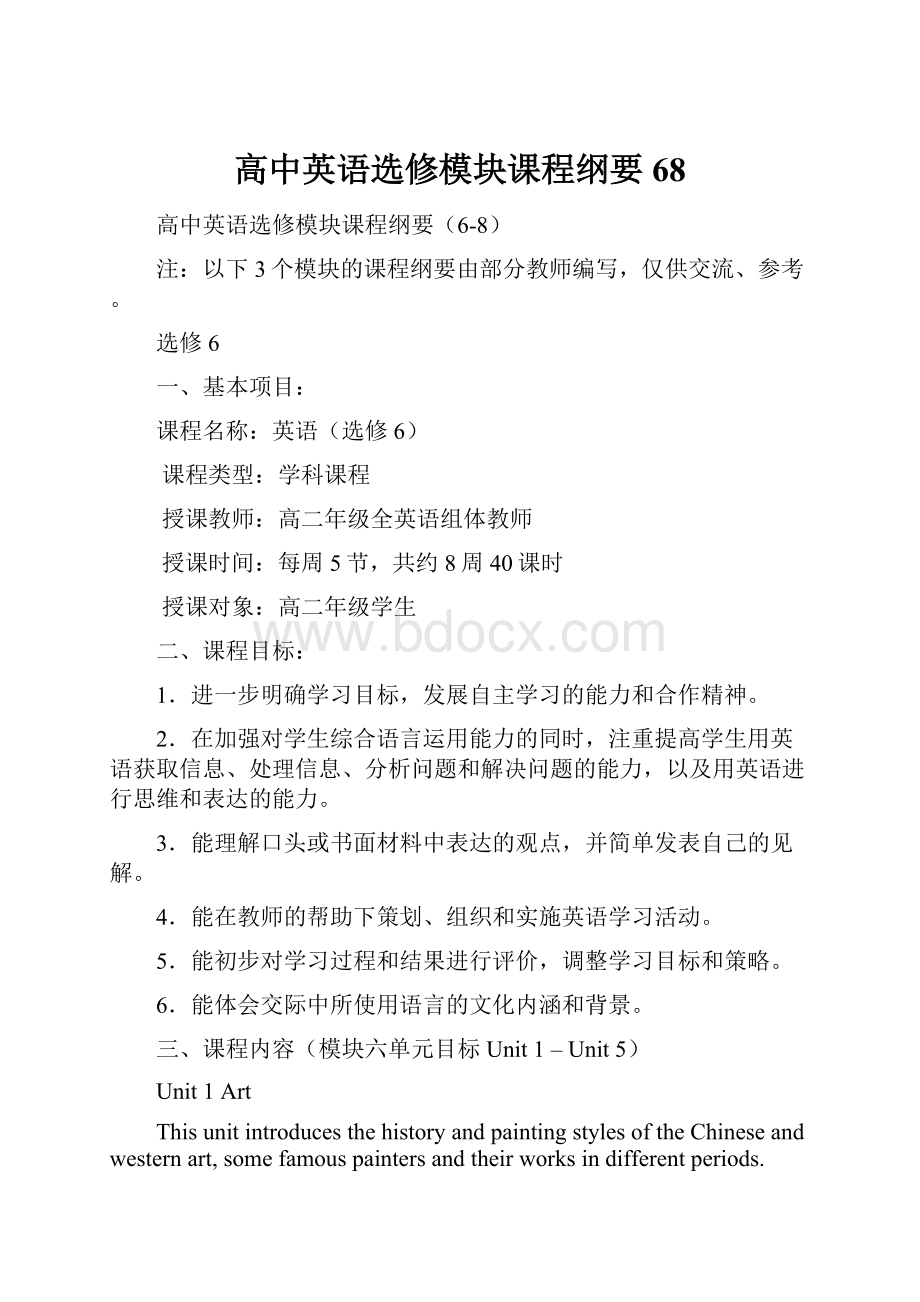高中英语选修模块课程纲要68Word下载.docx
《高中英语选修模块课程纲要68Word下载.docx》由会员分享,可在线阅读,更多相关《高中英语选修模块课程纲要68Word下载.docx(32页珍藏版)》请在冰豆网上搜索。

4.能在教师的帮助下策划、组织和实施英语学习活动。
5.能初步对学习过程和结果进行评价,调整学习目标和策略。
6.能体会交际中所使用语言的文化内涵和背景。
三、课程内容(模块六单元目标Unit1–Unit5)
Unit1Art
ThisunitintroducesthehistoryandpaintingstylesoftheChineseandwesternart,somefamouspaintersandtheirworksindifferentperiods.Afterreading,studentscanalsoknowaboutsomeofthemajormovementsinWesternartandhowarthaschangedstylisticallyoverthecenturies.Throughouttheunit,thetasksareaimingatgettingthestudentstoknowaboutthedifferentpaintingsandtheirstylesandhavetheinterestsinart.Studentsareaskedtoconsidertheirownpreferencesandtastesinart.Studentsarealsoaskedtoconsidertheirownenvironmentandhowtheycanimproveitartistically.
Unit2Poems
Thisunitintroducesthestudentstoseveralsimpleformsofpoems.Ittakesalookatsomepoeticdeviceslikerhythm,rhyme,repetition,soundpatternsandimagery.Thisunitprovidesstudentswiththeopportunitytodiscussthepoemspresentedtoknowaboutsomebasiccharacteristicsandwritingmethods,tolearntoenjoythesepoetry.Studentswillbeencouragedtowritetheirownpoemsusingtheircreativityandtheirpowersofobservation,toexperimentwithwordsandsounds,rhymeandrhythm.
Unit3Ahealthylife
Thetopicofthisunitishealthylife.Throughouttheunit,thestudentsaregivenopportunitiestoreflectonotherhealthissueswhichmayconcernthem.Theissuesdealtwithinthetextsofthisunitare:
HIV/AIDS,andappropriatebehaviouratparties,discos,nightclubsetcwherealcoholordrugsmaybepresent.ThisunitattemptstoprovideinformationaboutissuesthatmodernChinesestudentsmightencounterastheygrowintoadulthood.Theaimistogetthestudentstobefarawayfromthoseactivitiesthatcanbeharmfulfortheirhealthandtoformagoodhabitintheirlife.Itishopedthat,asaresult,theywillthenbelesslikelytoindulgeinriskybehaviour.
Unit4Globalwarming
Thisunitlooksatsomeoftheenvironmentalproblemsfacingtheworldtoday.Althoughonlyafewissuesarecovered,studentsaregiventheopportunitytothinkaboutothers.Thereadingtextsdealwithglobalwarming,savingenergy,andlittering.Listeningtextsincludeaninterviewaboutdifferentsourcesofenergy,aninterviewaboutanenvironmentalorganization,andapresentationaboutanotherenvironmentalorganization.Studentsareaskedtoresearchotherenvironmentaltopicsandgiveapresentation,writeanargumentandputtogetheranactionplanforanenvironmentalproject.Itishopedthatstudentswillbecomemoreawareofenvironmentalissuesthroughdoingthisunitanddevelopfurthertheirsenseofresponsibilitytowardstheenvironment.
Unit5Thepowerofnature
Thethemeofthisunitisdisastersthatarecausedbynaturalforces.Itexamineshowpeoplefeelindangeroussituationsandthewaysinwhichhumansprotectthemselvesfromnaturaldisasters.TheSBdealswithvolcanoes,theworkofvolcanologistsandtheextinctvolcanoTianchiinJilinProvince.TheWbexaminescyclonesandfloods.Thereadingandlisteningtextsprovidemodelsofthe–ingformandthefunction:
“Expressinganxiety,surpriseandfear”.Afterlearningthisunit,studentsareintendedtoknowaboutthepowerofnatureandgettorealizethatonlywhenhumansprotectthenaturewellcantheybeabletopreventnaturaldisastersandmakeuseofiteffectively.
四、课程实施
教材纲要
课时
目标
教法/学法
教学反馈
Wordsexpressionsandwarmingup
1
1.Knowledgeaims:
Learnaboutsomeimportantwordsandexpressions.
2.Abilityaims:
Learntousethewordsandexpressions.
3.Emotionalaims:
GetthestudentsnottobeafraidoflearningEnglish.
Listening
Reading
Tryto
explainin
English
BrainstormingtoencourageSstospeak
1.Dictation
2.Makingthesentenceswiththewordsandexpressionsgiven.
3.Translation
4.Completethesentenceswithwordsorphrases.
Readingandextensivereading
2
1.Teachingimportantpoints
Haveagoodunderstandingofthetextsbyfillingtheforms,answeringthequestions,judgingthestatements,etc.
Getthestudentstolearndifferentreadingskills,especiallygistreadingandcomprehendingbeyondlines.
2.Teachingdifficulties
Howtogetthegeneralideaofthetext.
Howtograspthedetailedtheinformationwhilereadingtounderstandthetextsbetter.
Trainthestudents’abilitytocooperatewithothers.
Arousethestudents’interestinart,poetry,theirsenseofagoodbehaviour,andresponsibilitytoprotecttheenvironment.
4.Teachingaids:
Multi-mediaclassroomandothernormalteachingtools.
Fastreadingtogetthegeneralidea.
Carefulreadingtoanswerthequestionsandjudgethestatements.
Listeningandspeaking.
1.Answerthequestionsafterreadingthetext.
2.Judgewhetherthestatementsaretrueorfalseaccordingtothetext.
3.Fillintheformsaccordingtothetext.
4.Finishsomeotherexercisesafterreadingthetext.
Languagepoints
Getthestudentstolearntheusefulexpressionsandsentencestructuresineachunit,andgetthemtomastertheusageofsomeusefulwordsandexpressions.
Enablethestudentstousethelanguagepointsbothorallyandinwrittenform.
Getthestudentstolearntoappreciatesomethingbeautiful,realizesomeproblemsaroudthemandformagoodlivinghabit.
Explanationandpracticing
Translationexercises.
Tofillintheblanks.
Otherformstocheckthestudents’understandingofthelanguagepoints.
Grammar
Enablethestudentstolearntousethegrammar:
theSubjunctiveMood,theuseof“it”andrevisethev-ingform.
Explainingbyexercises.
Consolidatingbymore
practice.
Exercisesrelatedtothegrammartocheckhowthestudentsgraspthegrammar.
Listeningandspeaking
Usefulphrases
Importantsentences
Trainthestudents’speakingabilitybydescribing,talkinganddiscussion.
Helpthestudentsimprovetheirlisteningability.
Trainthestudents’listeningability.Especiallylistenandunderstandthekeywordsandunderstandthespeakers’intentionandattitude.
Trainthestudentsabilitytocooperatewithothers.
PutstressonthekeypointsandguidetheSstolisten.
Ssdiscussingroupsandmakedialoguesorreports.
1.Asksomestudentswhodonotdaretoopentheirmouthtoanswersomeeasierquestions,soastoarisetheirinterestandgivethemconfidence.
2.Finishtheexercisesonlistening.
3.Haveadiscussioningroupsandreporttheideas.
Speakingandwriting
Helpthestudentstoconsolidatethewords,expressionsanddrillslearntineachunit.
Enablethestudentstocollectandlistinformation,thenselectwhattheythinkismostimportantandorganizeitforpresentation.
Enablethestudentstocreatesomesituationsforthemtotalkactivelyinpublic.
Trainthestudents’speakingability.
Trainthestudents’writingability.
Helpthestudentstobuildtheabilityofwriting.
Helpthestudentstogainthecouragetospeakinfrontoftheclass.
Helpthestudentstoapplywhattheyhavelearnedineachunit.
Brainstorming
Discussingroupsfirst
Writedowntheoutline.
1.Studentsreporttheirdiscussiontotheclass.
2.Studentswritetheirownwritings.
五、课程评价
1、评定方式:
从听说读写四个方面进行评价。
2、记分方式:
可分A,B,C,D等级记分,也可明确分数。
3、阶段测试(周周练、月考、期中期末考试)。
选修7
学校名称:
郑州九中
授课教师:
卢玉河
课程类型:
高二英语
授课时间:
2011年2月23日开始,一学期,每周六课时。
授课对象:
高二年级
学业成绩:
2学分
一、课程目标
高中英语课程的总目标是使学生在义务教育阶段英语学习的基础上,进一步明确英语学习的目的,发展自主学习和合作学习的能力;
形成有效的英语学习策略;
培养学生的综合语言运用能力。
综合语言运用能力的形成建立在语言技能、语言知识、情感态度、学习策略和文化意识等素养整合发展的基础上。
语言技能和语言知识是综合语言运用能力基础。
情感态度是影响学生学习和发展的重要因素。
学习策略是提高学习效率、发展自主学习能力的先决条件。
文化意识则是得体运用语言的保障。
为此,高中英语教学要鼓励学生通过积极尝试、自我探究、自我发现和主动实践等学习方式,形成具有高中生特点的英语学习的过程与方法。
高中英语课程的目标以义务教育一至五级的目标为基础,共有四个级别(六至九级)的目标要求。
其中七级是高中阶段必须达到的级别要求,八级和九级是为愿意进一步提高英语综合语言运用能力的高中学生。
设计的目标。
各个级别的要求均以学生的语言技能、语言知识、情感态度、学习策略和文化意识等五个方面的综合行为表现为基础进行总体描述。
高中英语课程六至九级课程目标的描述:
六级:
进一步增强英语学习动机,有较强的自主学习意识。
能理解口头或书面材料中表达的观点,并简单发表自己的见解。
能有效地使用口头或书面语言描述个人经历。
能在教师的帮助下策划、组织和实施英语学习活动。
能主动利用多种教育资源进行学习。
能初步对学习过程和结果进行自我评价,调整学习目标和策略。
能体会交际中所使用语言的文化内涵和背景。
七级:
有明确和持续的学习动机和自主学习意识。
能就熟悉的话题交流信息,提出问题并陈述自己的意见和建议。
能读懂供高中学生阅读的英文原著简写本及英语报刊。
具有初步的实用写作能力,例如:
事务通知和邀请信等。
能在教师的指导下,主动参与计划、组织和实施语言实践活动。
能主动扩展和利用学习资源,从多渠道获取信息,并能利用所获得的信息进行清楚和有条理的表达。
具有较强的自我评价和自我调控能力,基本形成适合自己的学习策略。
理解交际中的文化差异,初步形成跨文化交际意识。
八级:
有较强的自信心和自主学习能力。
能就熟悉的话题与讲英语的人士进行比较自然的交流。
能就口头或书面语言材料的内容发表评价性见解。
能写出连贯且结构完整的短文。
能自主策划、组织和实施各种语言实践活动,例如:
商讨和制定计划、报告实验和调查结果。
能有效利用网络等多种教育资源获取和处理信息,并根据需要对所获得的信息进行整理、归纳和分析。
能自觉评价学习效果,形成有效的英语学习策略。
了解交际中的文化内涵和背景,对异国文化能采取尊重和包容的态度。
九级:
能独立、自主地规划并实施学习任务。
能听懂有关熟悉话题的演讲、讨论、辩论和报告的主要内容。
能就国内外普遍关心的问题(例如:
环保、人口、和平与发展等)用英语进行交谈,表明自己的态度和观点。
能做日常生活方面的口头翻译。
能利用各种机会用英语进行真实交际。
能借助词典阅读题材较为广泛的科普文章和文学作品。
能用常见的应用文体完成一般的写作任务,并具有初步使用文献的能力。
能自主开拓学习渠道,丰富学习资源。
能关注时事,具有较强的世界意识。
新课标对词汇的新要求:
新标准加强了对词汇的要求,高中阶段从原来的1800--2000个增加到3300个单词和400--500个习惯用语或固定搭配,优秀的要达到4500--5000个词汇。
课程标准新的学生观认为,促进个性发展是课程的根本目标。
一切为了学生个性发展是课程标准的出发点和归宿。
新课标对阅读的新要求:
新课标要求学生在在高中毕业时要达到36万词以上的阅读量,高一,
高二分别要达到20万和30万词以上。
新标准要求高中毕业能理解阅读材料中不同的观点和态度,能识别不同文体的特征,能通过分析句子结构理解难句和长句,能在老师的帮助下欣赏浅显的文学作品,能根据学习任务的需要从电子读物或网络中获取信息,并进行加工处理
二、课程目标解读
1、新标准增加了情感因素、学习策略以及文化意识和跨文化交际能力等方面,体现了以人为本的教育观念,培养学生的终生学习能力,培养学生健全的人格和技能发展能力,提到了教育成功的核心。
新课程的“三维目标”中,“知识与技能”目标长期以来是我国基础教育课程主要甚至是唯一的目标,它强调基础知识和基本技能的获得;
“过程与方法”突出的是让学生“学会学习”,使学生获得知识的过程同时成为获得学习方法和能力发展的过程;
“情感态度与价值观”则是建立在人文主义教育思想的基础上的,它致力于教育的终极目的即人格完善。
“知识与技能”是最基础的,或者说是前提条件。
一个没有打好“知识与技能”基础的学生,不可能会很好地完成“